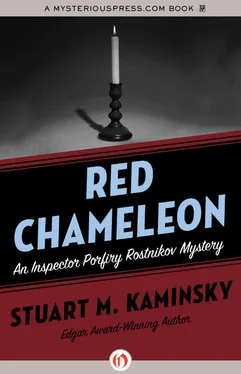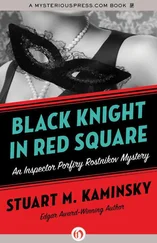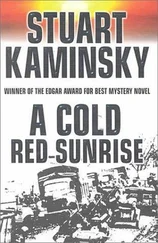Stuart Kaminsky - Red Chameleon
Здесь есть возможность читать онлайн «Stuart Kaminsky - Red Chameleon» весь текст электронной книги совершенно бесплатно (целиком полную версию без сокращений). В некоторых случаях можно слушать аудио, скачать через торрент в формате fb2 и присутствует краткое содержание. Год выпуска: 2012, ISBN: 2012, Издательство: MysteriousPress.com/Open Road, Жанр: Полицейский детектив, на английском языке. Описание произведения, (предисловие) а так же отзывы посетителей доступны на портале библиотеки ЛибКат.
- Название:Red Chameleon
- Автор:
- Издательство:MysteriousPress.com/Open Road
- Жанр:
- Год:2012
- ISBN:978-1-4532-6632-8
- Рейтинг книги:4 / 5. Голосов: 1
-
Избранное:Добавить в избранное
- Отзывы:
-
Ваша оценка:
- 80
- 1
- 2
- 3
- 4
- 5
Red Chameleon: краткое содержание, описание и аннотация
Предлагаем к чтению аннотацию, описание, краткое содержание или предисловие (зависит от того, что написал сам автор книги «Red Chameleon»). Если вы не нашли необходимую информацию о книге — напишите в комментариях, мы постараемся отыскать её.
Red Chameleon — читать онлайн бесплатно полную книгу (весь текст) целиком
Ниже представлен текст книги, разбитый по страницам. Система сохранения места последней прочитанной страницы, позволяет с удобством читать онлайн бесплатно книгу «Red Chameleon», без необходимости каждый раз заново искать на чём Вы остановились. Поставьте закладку, и сможете в любой момент перейти на страницу, на которой закончили чтение.
Интервал:
Закладка:
In the rumbling metro Rostnikov looked over at a woman with an avoska, a string sack on her lap, and wondered briefly if his case had actually made it to the desk of Andropov. It was possible but not terribly likely. It would have made the situation more bearable for him to know that it had reached such a level.
More painful, however, was the knowledge that Rostnikov’s son, Josef, who was serving his time in the army and stationed in Kiev, would certainly be part of the continuing stalemate. Were the papers to be released to Stern or the New York or London Times, Josef would be on the next plane to Afghanistan. That threat had been made explicit by Drozhkin.
“We’re here,” Zelach said, shouldering past a pair of young men with paper sacks under their arms. One of the younger men considered a look of anger, let his eyes take in the two disgruntled policemen, and changed his mind.
Rostnikov dragged his leg behind him and just managed to get through the door of the train and onto the platform of the Prospekt Vernadskogo station behind Zelach as the door closed. He glanced back into the passing train and caught a look of clear hatred from the now-safe young man within. Had the young man been within reach, Rostnikov probably would have lifted him off the ground and shaken him like a sack of grain.
“Zelach,” he said as they rode up the escalator, “do you think of me as a violent man?”
“No, chief inspector,” said Zelach indifferently. “There’s a stand on the corner. I have not eaten. Would it be all right if I bought some blinchiki?”
“It would be all right, Comrade Zelach,” Rostnikov said sarcastically, but the sarcasm was lost on Zelach. “Do you want to know where we are going?”
Zelach shrugged as they pressed through the morning crowd.
“In that case, we will let that be your surprise for the day.”
In almost any country in the world, the knowledge that a murder had taken place would draw a crowd. In Naples, it would be almost impossible for the police to make their way through the crush of curious onlookers speculating on who had done what to whom and for what reasons. The situation would have been the same in Liverpool, Tokyo, Cleveland, or Berne, but in Moscow the sidewalk in front of the tenement was clear. Curiosity was there, but it was overcome by the fear of becoming involved, questioned, asked to remember and comment, to be made part of an official report.
The building was one of the Stalin postwar blocks that looked like pale refrigerators. The apartments were usually dark, small, and far too hot in the summer. One could be easily disoriented by the sameness of such structures all over the city. Since Rostnikov’s own apartment on Krasikov Street was from the same period and in the same style, although in a slightly better neighborhood, he was filled with a weary sadness as he followed Zelach through the door and into the small lobby.
There was no one there, no children, no old people. The building seemed deserted for a Wednesday evening, but both Rostnikov and Zelach were accustomed to this. Later, Zelach would wearily knock on doors and cajole, threaten, or force statements from people who insisted that they had seen and heard nothing.
“Floor?” Zelach asked.
“Three,” said Rostnikov, moving to the stairwell. The trip up the concrete steps was slow due to Rostnikov’s leg, and since their voices echoed unpleasantly, as in Lenin’s tomb, they said nothing.
When Rostnikov opened the door on the third floor, a small girl, no more than four, stood staring at him. Her hair was braided behind her, and she sucked her thumb. Rostnikov smiled.
“Oo menya temperatoora,” the little girl said, indicating that she had a temperature.
“I’m sorry to hear that,” said Rostnikov.
“They killed the man with the beard,” she said round her thumb.
“So I understand,” said Rostnikov.
“Who are they?” the little girl asked, now taking her thumb from her mouth.
“We will see,” said Rostnikov. Zelach stood, hands behind his back, patiently waiting for his superior to finish interrogating the child.
“Will they come back?” said the girl. Her eyes were so pale blue that they almost blended with the white and reminded Rostnikov of his own son as a child.
“They will not come back,” Rostnikov assured her. “Did you see them?”
The girl shook her head no and glanced down the hall at a door that was now creaking open. An old woman dressed in black came out of the open door, looking quite frightened and stepping as if the floor were made of the shells of eggs.
“Elizaveta,” the babushka whispered, not looking at the men. “Come now.”
“No,” the child said, looking coyly at Rostnikov.
“I think you should go, Elizaveta,” Rostnikov said. “You have a temperature.”
The girl giggled and ran to her grandmother, who snatched her in by the arm after giving an apologetic and very guilty look in the general direction of the two policemen. The door closed, and the men were alone again.
“You’ll talk to the old woman later,” Rostnikov said.
Zelach nodded, and they strode to the door of number 31. Rostnikov knocked and was answered almost immediately by a woman’s voice.
“Yes,” the voice said, strong, familiar, and in command.
Rostnikov knew who it was, and the knowledge drained him further.
“Inspector Rostnikov,” he said, and the door opened to reveal the uniformed presence of Officer Drubkova, her face pink and eager, her zeal oppressive and tiring.
“Comrade inspector,” she said, stepping back to let him in. “This is the victim’s daughter and son, Sofiya and Lev Savitskaya. The victim is Abraham Savitskaya, eighty-three years. His body is still in the bath down the hall.” She nodded with her head as Rostnikov and Zelach came in. Rostnikov caught the eyes of the no-longer young woman standing in the corner with one arm around a boy whose frightened eyes tried to take in everything at once, to keep everyone and all things in view so they could not get behind him. There was something about the woman that struck Rostnikov. It was like seeing for the first time a relative known only in childhood. If she were the victim’s daughter, then she was at least half Jewish, and so, he thought, there may be some reminder of Sarah, but it went beyond that, and when she moved, he knew what it was.
The woman stepped forward as if to ask a question, and her limp was pronounced, quite similar to Rostnikov’s own. Perhaps she had seen him move into the room and made the connection.
“Excuse me,” she said.
Officer Drubkova, ever efficient, moved to the woman, probably to guide her back to the corner until the inspector was ready for her. Drubkova’s firm hands took the woman’s shoulders, but Sofiya Savitskaya did not turn away. The boy stayed back, eyes darting.
“It is all right, officer,” Rostnikov said, shifting his coat to his other arm.
Zelach asked, indelicately, “You want me to go look at the corpse?”
Rostnikov nodded first at Zelach, who lumbered back into the hall, and then at the woman, who had limped forward.
“They killed my father,” she said.
“We know,” Rostnikov answered, and realized that he had one of the dazed ones, the ones for whom the trauma had been so great that they viewed violent events of the immediate past as if they were of no time, no place, just vague images they were trying to get to stop shimmering long enough to ask questions about their reality.
“The two men shot him,” she said. The boy moved forward, frightened, to hold his sister’s arm. If she were lost in madness, he would have no one.
“She will be all right,” Rostnikov assured the boy. “This is one of the natural reactions. Why don’t we all sit down. …”
Читать дальшеИнтервал:
Закладка:
Похожие книги на «Red Chameleon»
Представляем Вашему вниманию похожие книги на «Red Chameleon» списком для выбора. Мы отобрали схожую по названию и смыслу литературу в надежде предоставить читателям больше вариантов отыскать новые, интересные, ещё непрочитанные произведения.
Обсуждение, отзывы о книге «Red Chameleon» и просто собственные мнения читателей. Оставьте ваши комментарии, напишите, что Вы думаете о произведении, его смысле или главных героях. Укажите что конкретно понравилось, а что нет, и почему Вы так считаете.












